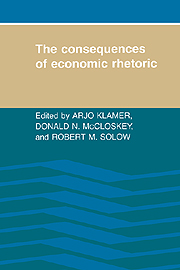Book contents
- Frontmatter
- Contents
- Preface
- The consequences of economic rhetoric
- PART I ECONOMIC RHETORIC: INTRODUCTION AND COMMENTS
- 1 Economics in the human conversation
- 2 Comments from outside economics
- 3 Comments from inside economics
- 4 Rhetoric and ideology
- PART II ECONOMIC RHETORIC: FURTHER ARGUMENTS
- PART III ECONOMIC RHETORIC AMONG ECONOMISTS
- PART IV ECONOMIC RHETORIC IN POLITICS AND JOURNALISM
- PART V ECONOMIC RHETORIC: ITS RHETORIC AND ITS CONSEQUENCES
- 1 Appendix: Other contributors and participants
- Index
1 - Economics in the human conversation
Published online by Cambridge University Press: 07 September 2010
- Frontmatter
- Contents
- Preface
- The consequences of economic rhetoric
- PART I ECONOMIC RHETORIC: INTRODUCTION AND COMMENTS
- 1 Economics in the human conversation
- 2 Comments from outside economics
- 3 Comments from inside economics
- 4 Rhetoric and ideology
- PART II ECONOMIC RHETORIC: FURTHER ARGUMENTS
- PART III ECONOMIC RHETORIC AMONG ECONOMISTS
- PART IV ECONOMIC RHETORIC IN POLITICS AND JOURNALISM
- PART V ECONOMIC RHETORIC: ITS RHETORIC AND ITS CONSEQUENCES
- 1 Appendix: Other contributors and participants
- Index
Summary
Exordium
“As civilized human beings,” wrote Michael Oakeshott in 1933, “we are the inheritors, neither of an inquiry about ourselves and the world, nor of an accumulating body of information, but of a conversation begun in the primeval forest and extended and made more articulate in the course of centuries.” In economics a few years ago a conversation about the conversation began.
Why it began is not clear. It might be interpreted as just carrying on an old conversation about how economists know (if they do), a methodological conversation started a century and more ago by John Stuart Mill. The new remark in the early 1980s was simply that economists use arguments beyond syllogism and measurement. The point of making it was not to undercut the mathematics in economics, as nonmathematicians sometimes wish they could. The point was merely to note that all economists, mathematical or not, use analogies, appeals to authority, and other rhetorical devices, using them as thoroughly as poets and preachers, though with less understanding of why they do so. So the recent conversation about conversation can be interpreted as more of the old stuff, an inward and philosophical affair (Klant 1985).
The new conversation might also be interpreted as arising from the battle of schools. This would be additional looking inward. Disagreements among economists are commonly exaggerated, even by economists themselves, yet it is true that the field had become by 1980 more warlike than fifteen years before. Everyone knows about the battle between Keynesians and monetarists (the tags mean something different now to politicians than they once meant to economists).
- Type
- Chapter
- Information
- The Consequences of Economic Rhetoric , pp. 3 - 20Publisher: Cambridge University PressPrint publication year: 1989
- 1
- Cited by

